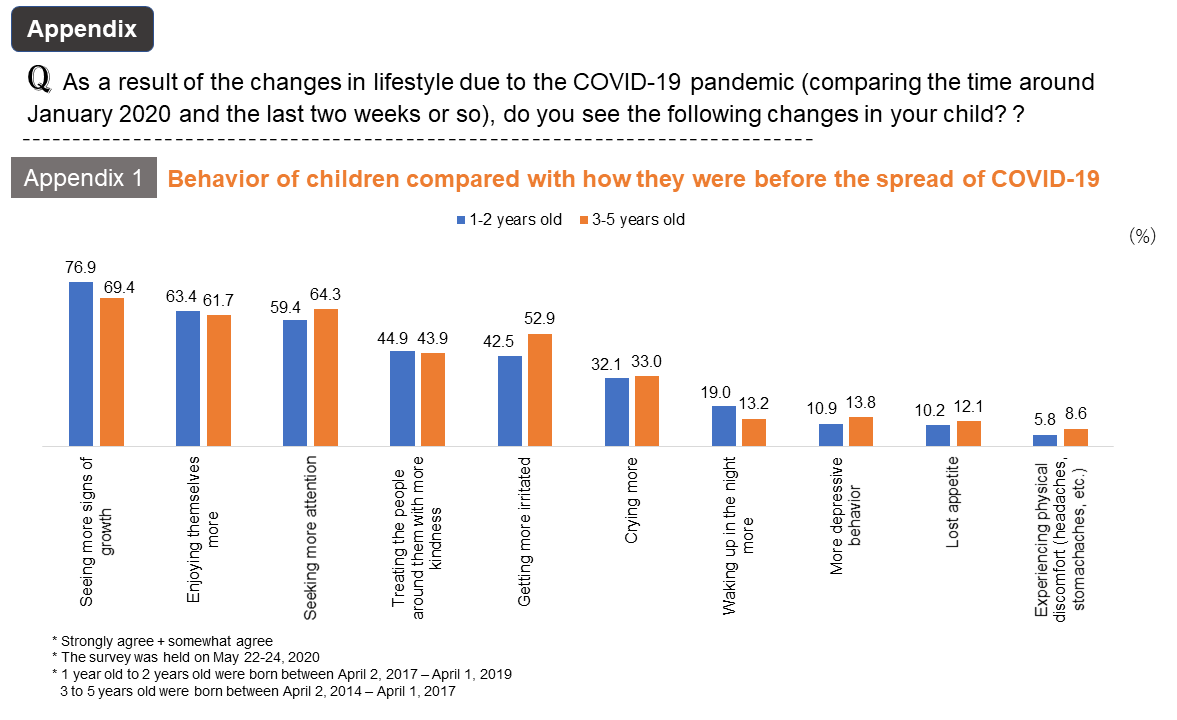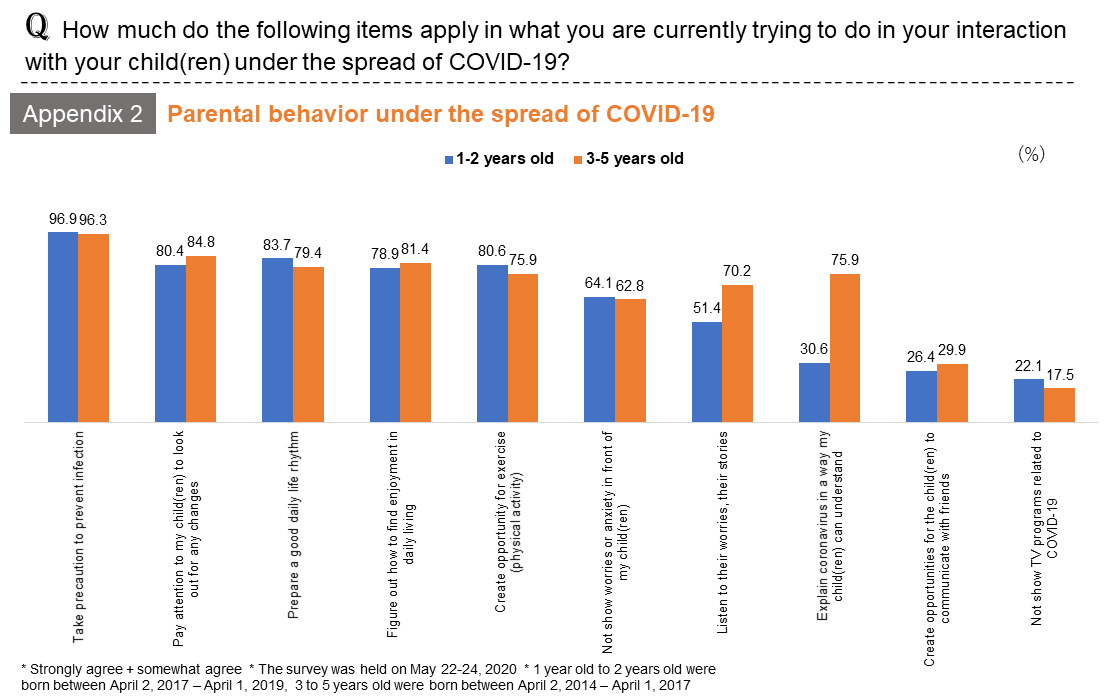Summary
Approx. 80% of mothers of young children wanted "to value human connections" more than they did before the spread of COVID-19
- The key to easing the anxiety of childrearing during the COVID-19 pandemic is human connections
Benesse Educational Research and Development Institute, an in-house think tank of Benesse Corporation Inc. (Headquarters: Okayama city, Representative Director and President: Hitoshi Kobayashi) held a survey on May 22-24, 2020, with the purpose of shedding light on the impact of the pandemic of the new infectious disease caused by SARS-CoV-2 (COVID-19) and the resultant changes in the living environment affecting young children and their parents. The survey was held just before May 25 when the State of Emergency was lifted in Japan. Here are the survey results of 1,030 mothers of children from one year to six years old (before entering elementary school).
The following shows the major findings of the survey:
- Approx. 80% of mothers wanted to value "human connections" and "time with my family" more than they did before the spread of COVID-19.
- I want to value human connections ("I've come to feel that way" more than I did in the pre-COVID-19 period (Strongly agree + somewhat agree))...... 82.7%
- I want to value time with my family (ditto)...... 83.0%
- I want to value human connections ("I've come to feel that way" more than I did in the pre-COVID-19 period (Strongly agree + somewhat agree))
- Approx. 20 to 30% of mothers said they "don't have any connection" (with the preschool, local community) due to worries or troubles in the COVID-19 pandemic.
- Reduced opportunities to see friends (multiple answers. Third among 17 items)...... 53.9% (60.1% in the areas under the State of Emergency)
- My child doesn't have any connection with teachers, community members, etc. (ditto, seventh)...... 30.1% (ditto, 38.0%)
- I myself don't have a connection with the school or community. (ditto, eleventh)...... 19.7% (ditto, 22.3%)
- Mothers felt joy in childrearing and less anxious when they have human connections during the COVID-19 pandemic.
- Approx. 70% of mothers felt both joy and anxiety in childrearing under the condition of the COVID-19 pandemic
- I find joy in childrearing (Strongly agree + somewhat agree)...... 69.7%
- I'm anxious about whether my child has grown well or not (ditto)...... 70.9%
- As for the number of human connections through childrearing, many answered "three or more," however, nearly 10% of mothers said "no one."
(Refer to Fig 3-2 for the result of the answers "connection with one person" and "connection with two people") - People I can talk to freely about parenting ... three or more 42.5%, no one 6.3%
- People who care about me ... three or more 46.4%, no one 9.7%
- Mothers were more likely to feel more joy and less anxiety in childrearing when human connections* through childrearing was richer.
- [Group with numerous connections] I find joy in childrearing 82.0 % ⇔ [Group with few connections] ditto 54.0%
- [Group with numerous connections] I'm anxious about whether my child has grown well or not 62.2 % ⇔ [ Group with few connections ] ditto 78.9 %
- Joy and confidence scored higher when mothers felt their spouse/partner was dealing with childrearing or COVID-19 together, for example, when they listened to the mothers talk about their child care concerns, or considered how to cope with COVID-19 together.
- Two in three mothers answered their spouse/partner considered how to cope with COVID-19 together.
- Listens to my child care concerns (Strongly agree + somewhat agree) ...... 68.3%
- Considers how to cope with COVID-19, together (ditto)...... 66.5%
- Mothers tend to enjoy childrearing more and have higher confidence when they can feel they have the support of their spouse/partner
- [Group with large support]** I find joy in childrearing 82.1% ⇔ [Group with small support] ditto 58.3%
- [Group with large support] I feel I'm doing well more or less 83.6% ⇔ [Group with small support] ditto 63.1%
* For classifying Group with numerous connections and Group with few connections (apart from spouse/partner), answers to "People I can talk to freely about parenting," "People I can talk to about my parenting concerns," "People who can give me information about parenting," "People who care about my child," and "People who care about me" were scored and the total was divided into three groups (middle group is omitted).
** For classifying Group with numerous connections and Group with few connections, answers to "Listens to my child care concerns," "Considers how to cope with COVID-19, together," "Understands my child care, housework, work difficulties, etc.," and "Supports my stress relief" were scored. The total was divided into three groups (middle group is omitted).
♦Observation from the survey results
[Summary of the results]
In this survey held in late May, approx. 80% of mothers of young children responded that they wanted to value "human connections" more than they did before the spread of COVID-19 (1). In the COVID-19 pandemic, 20 to 30 % of mothers were feeling troubled because they (children and mothers) were not able to have connection with daycare/preschool or the local community (2), and approx. 70% of mothers were enjoying childrearing, despite feeling anxious (3-1). Such feelings toward childrearing and "human connections" are correlated. Mothers who have someone to talk freely about parenting, have someone who cares about them, or feel supported by their spouse have a lower level of anxiety in childrearing and a higher level of positive attitude (3-3, 4-2).
[Discussion]During the time when going out or taking children to daycare/preschool was restricted, families with young children were likely to be isolated. In such a situation, mothers were feeling a high level of not only enjoyment but also anxiety toward childrearing. It is natural for anyone to feel anxious in an unknown situation. Emotional care for parents who are taking care of their children is also necessary. What is important is for the parents to maintain "human connections" with those who can talk about childrearing and who care about them, and not become isolated. Connection is important in ordinary times, but its importance has increased in the time of the COVID-19 pandemic when meeting people directly is difficult.
Mutual support with the spouse, the closest person, is of course important. Moreover, it is now further required to establish a new way of connecting to meet the needs of the "life with COVID era," making good use of online systems, and offer an environment where parents can raise their children with peace of mind. In addition, it may be important for parents themselves to develop "human connections" which offer mutual support without meeting directly, as well as specific means to maintain such connections.
Benesse Educational Research and Development Institute will continue our research and send out information on what we have learned from the first wave of COVID-19 in our sincere wish to offer help toward the improvement of childrearing and education.
Outline of the survey
| Title | "Survey of the impact of COVID-19 on the lives of young children and elementary school students (held in May 2020)" |
|---|---|
| Purpose of the survey | To clarify the impact of the spread of COVID-19 and accompanying changes in the living environment on young children and elementary school students, and their parents |
| Survey method | Internet survey |
| Survey area | Throughout Japan |
| Survey period | May 22-24, 2020 |
| Subject of the survey | 2,266 mothers of one year old (born in FY2018) - children in sixth grade in elementary school * This release analyzes responses of 1,030 mothers of young children before school age (one year old to six years old) |
| Survey items | Living conditions and behavior of children/anxiety and concerns of mothers in childrearing, awareness related with childrearing, childrearing behavior, intention of prospective childrearing and education, etc. |
| Research supervisors, collaborator, planners/analyzers | •Research supervisor: Yoichi Sakakihara (Executive advisor of Benesse Educational Research and Development Institute, Director of Child Research Net, Professor Emeritus of Ochanomizu University) / Satoko Ando (Professor of Faculty of Human Sciences, University of Tsukuba) •Collaborator: Haruo Kimura (Principal Researcher, BERD) •Planner, analyzer: Junko Takaoka (Principal Researcher, BERD), Qinfeng Shao (Senior Researcher, BERD), Seiko Mochida (Senior Researcher, BERD), Mieko Sanada (Senior Researcher, BERD), Jiwon Lee (Researcher, BERD) |
* Comments of the contents of this release by the research supervisors are uploaded on the website of Benesse Educational Research and Development Institute (in Japanese).
https://berd.benesse.jp/jisedai/research/detail1.php?id=5520
* At Benesse Educational Research and Development Institute and Child Research Net (CRN), we consult experts for solutions to issues on COVID-19 surrounding children.
"COVID-19 Information Surrounding Children" https://www.childresearch.net/covid-19-en.html
Details of Survey Results
1. Approx. 80% of mothers wanted to value "human connections" and "time with my family" more than they did before the spread of COVID-19.- I want to value human connections ("I've come to feel that way" more than I did in the pre-COVID-19 period (Strongly agree + somewhat agree))......82.7%
- I want to value time with my family (ditto)......83.0%
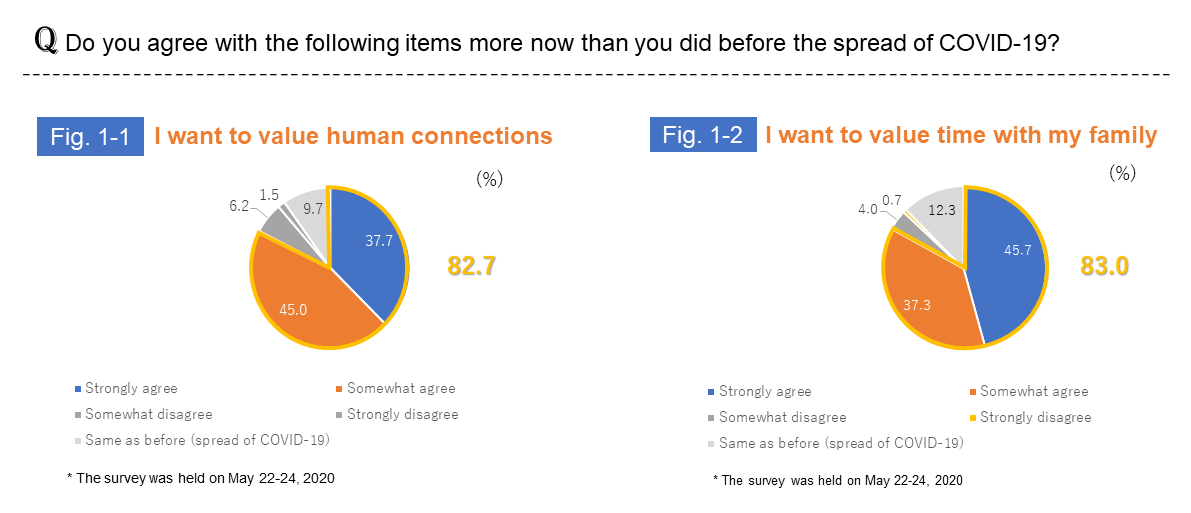
2. Approx. 20 to 30% of mothers said they "don't have any connection" (with the daycare/preschool, local community) due to worries or troubles in the COVID-19 pandemic.
- Reduced opportunities to see friends (multiple answers. Third among 17 items)......53.9% (60.1% in the areas under the State of Emergency)
- My child doesn't have any connection with teachers, community members, etc. (ditto, seventh) ......30.1% (ditto, 38.0%)
- I myself don't have a connection with the school or community. (ditto, eleventh) ......19.7% (ditto, 22.3%)
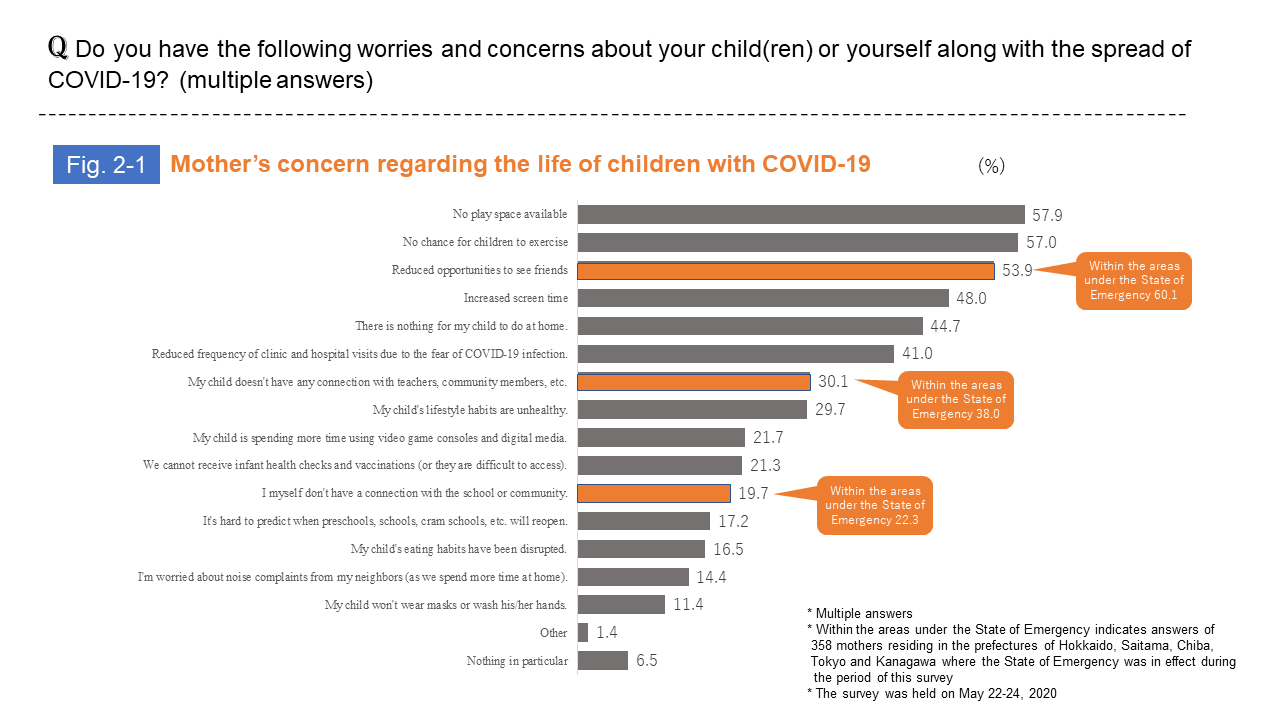
3. Mothers felt joy in childrearing and less anxious when they have human connections in the COVID-19 pandemic.
- Approx. 70% of mothers felt both joy and anxiety in childrearing under the condition of the COVID-19 pandemic
- I find joy in childrearing (Strongly agree + somewhat agree) ......69.7%
- I'm anxious about whether my child has grown well or not (ditto) ......70.9%
- As for the number of human connections through childrearing, many answered "three or more," however, nearly 10% of mothers said "no one."
- People I can talk to freely about parenting ... three or more 42.5%, no one 6.3%
- People who care about me ... three or more 46.4%, no one 9.7%
- Mothers were more likely to feel more joy and less anxiety in childrearing when social support through childrearing is richer.
- [Group with numerous connections] I find joy in childrearing 82.0 % ⇔ [Group with few connections] ditto 54.0%
- [Group with numerous connections] I'm anxious about whether my child has grown well or not 62.2% ⇔ [ Group with few connections ] ditto 78.9%
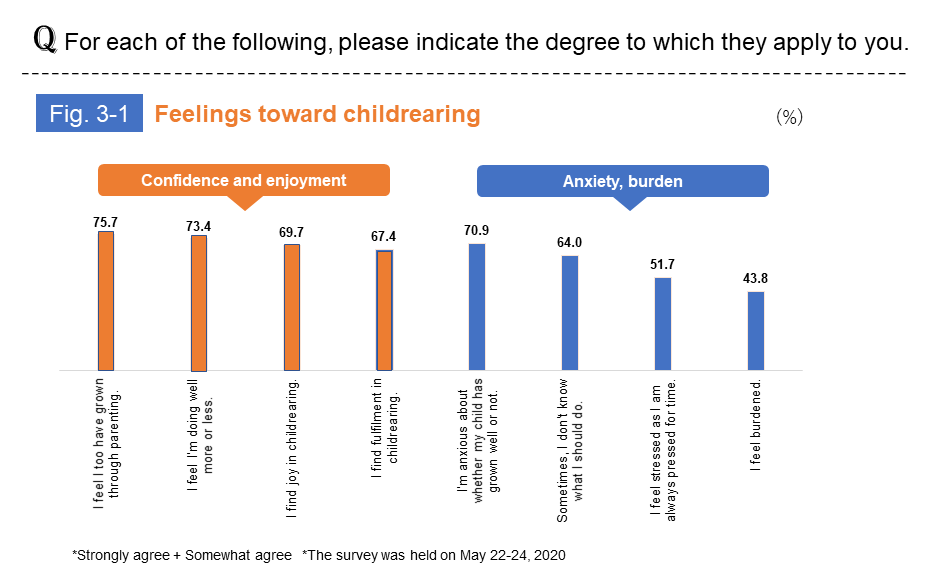
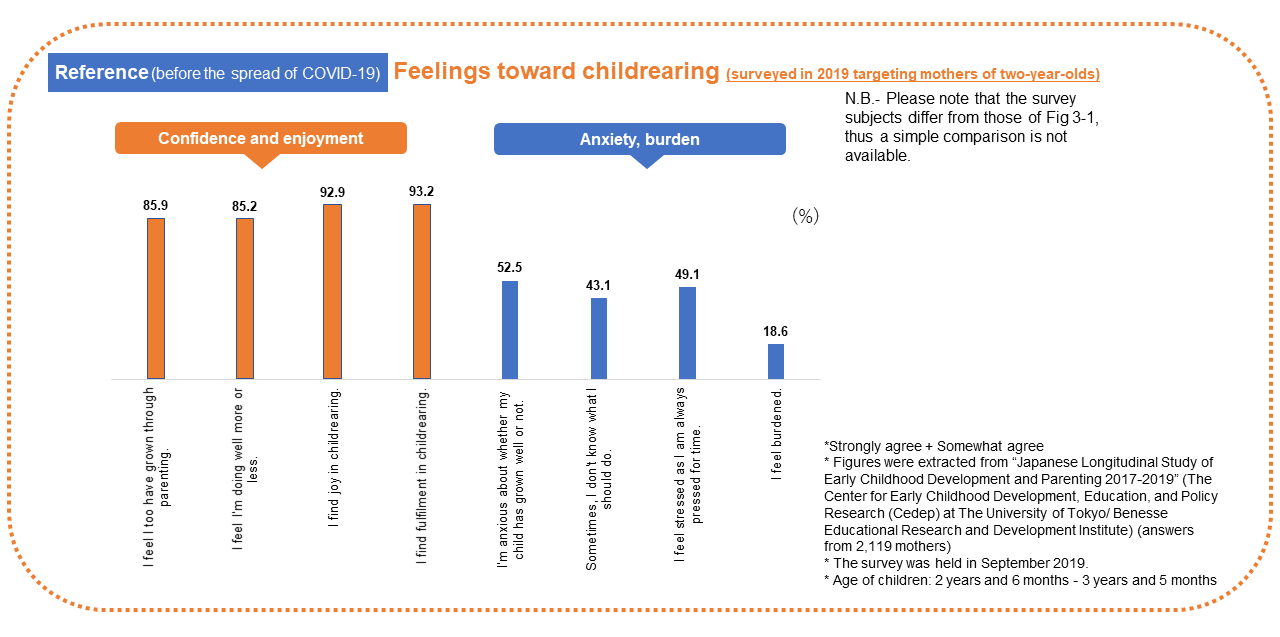
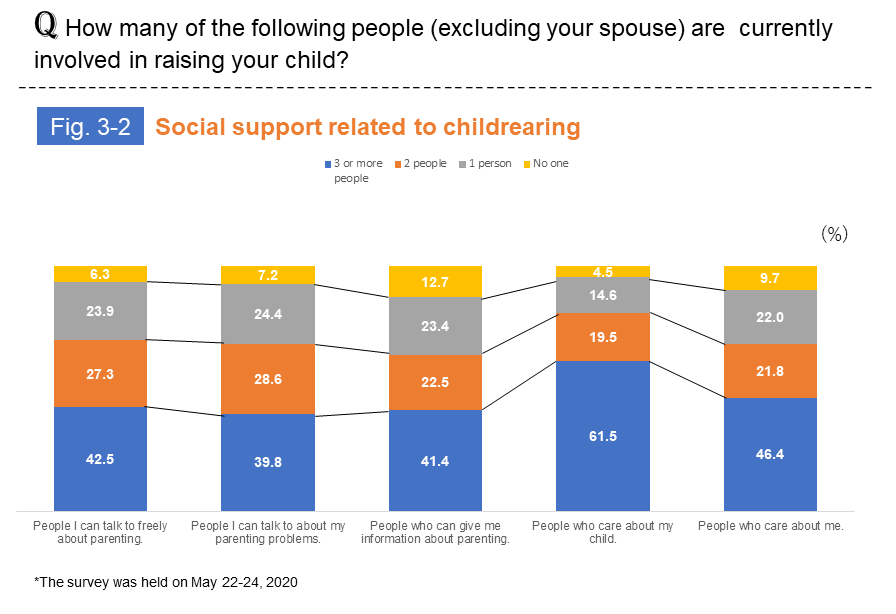
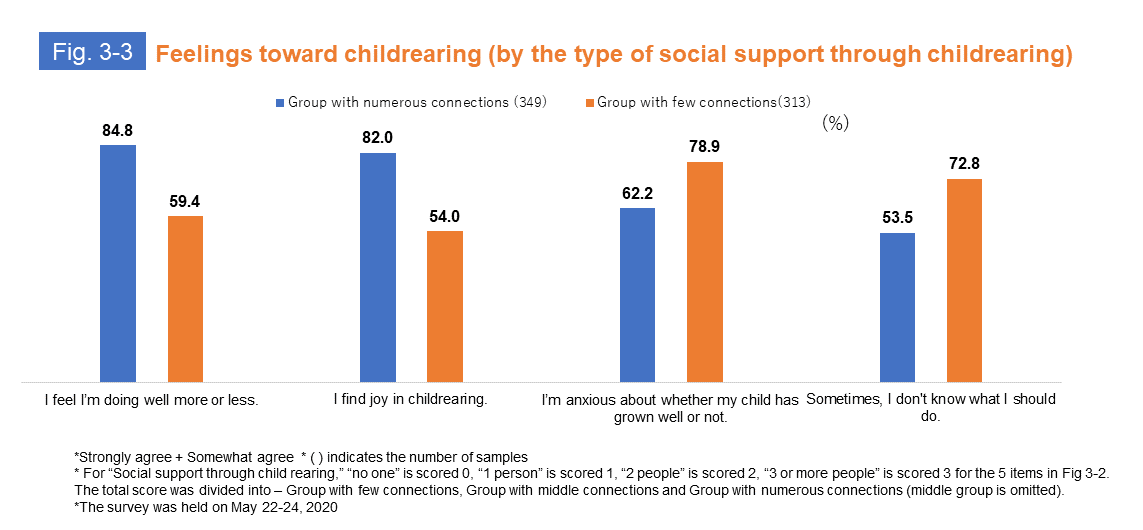
4. Joy and confidence scored higher when mothers felt their spouse/partner was dealing with childrearing or COVID-19 together, for example, when they listened to the mothers talk about their child care concerns, or considered how to cope with COVID-19 together.
- Two in three mothers answered their spouse/partner considered how to cope with COVID-19 together.
- Listens to my child care concerns (Strongly agree + somewhat agree) ......68.3%
- Considers how to cope with COVID-19, together (ditto) ......66.5%
- Mothers tend to enjoy childrearing more and have higher confidence when they can feel they have the support of their spouse/partner
- [Group with large support] I find joy in childrearing 82.1% ⇔ [Group with small support] ditto 58.3%
- [Group with large support] I feel I am doing well more or less 83. 6% ⇔ [Group with small support] ditto 63.1%
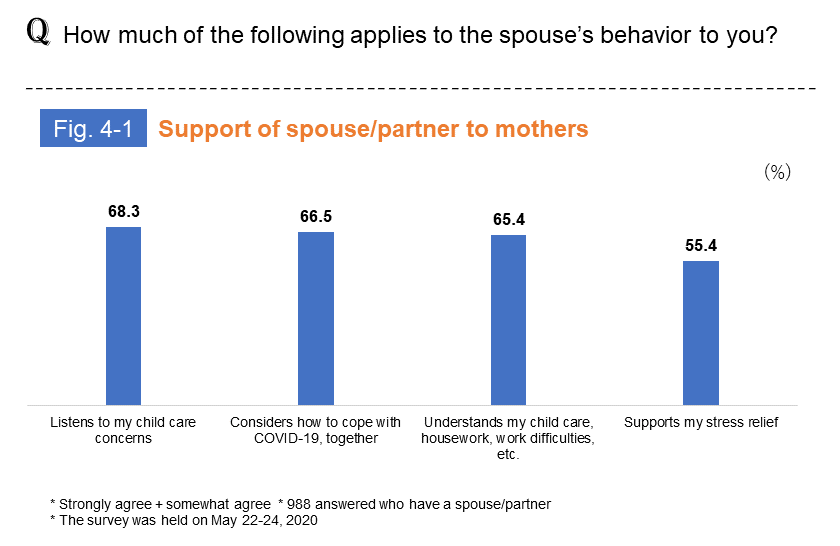
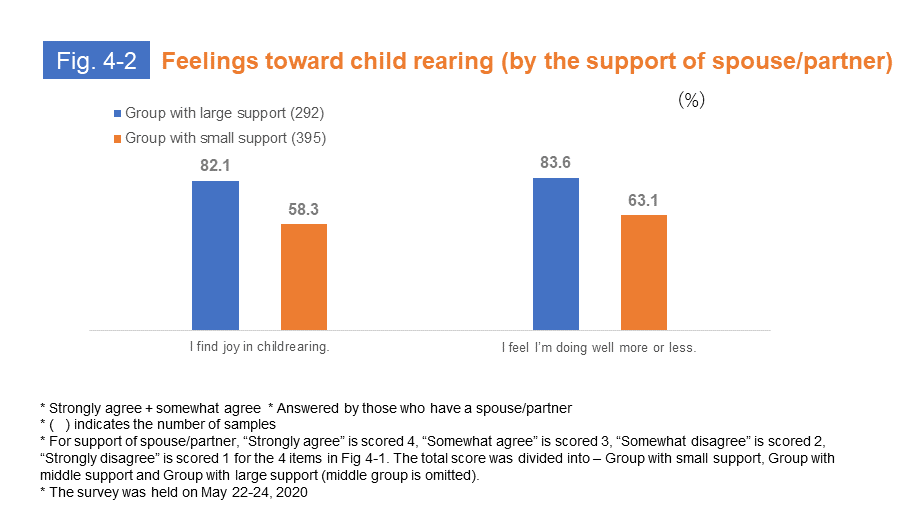
Appendix
